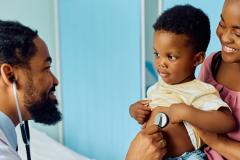- Overview
-
The fetal brain is unique among fetal organs in that it undergoes profound changes throughout pregnancy, some of which are transient in that they appear and disappear as the brain matures.
With ultrasound and fetal MRI, we have a unique opportunity to look at the fetal brain while it is developing. I use special techniques with ultrasound and magnetic resonance imaging to look at the fetal brain at different stages of pregnancy. Our technique is a new way to assess brain tissue which allows us to evaluate milestones in normal development.
Understanding the imaging appearance of the normal brain is critical in recognizing abnormal development, whether due to a malformation, genetic defect, an infection in pregnancy, bleeding in the brain, or other signs of brain damage. My research focuses on identifying fetuses at risk for prenatal brain damage, with the goal of understanding why it happens and what we can do to prevent it
- Research
-
Current Projects
Quantitative ultrasound for detecting abnormalities of the placenta: Measuring the stiffness of the placenta to help diagnose fetal growth restriction.Current Projects
Shear wave absolute vibro-elastography of the placenta. The objectives of this study are to define SWAVE characteristics in the normal placenta. SWAVE is a potentially valuable new tool to explore placental function and health in both the clinical and research settings.Current Projects
Postmortem MRI (3 Tesla at the CFRIF Research Facility) and ultrasound imaging. We are developing strategies to look at different aspects of fetal development, and in particular, brain maturation including myelination. Comparison with antenatal MRI and ultrasound, as well as autopsy information, is being performed.GrantsCanadian Foundation for Innovation - PI: PRIME Research Facility at BC Women's Hospital and Health Centre, 2015
CHRP; Coinvestigator, 2016
VCHRI Innovation and Translational Research Award, Coinvestigator, 2016
Collaboration led by BCCHR researchers awarded European funding to improve community-based care in Uganda and Kenya
Dr. Matthew Wiens and colleagues at the Institute for Global Health are the first Canadian Team to lead a Horizon Europe Pillar 2 project that aims to reduce childhood deaths from severe infection (sepsis) after hospital discharge.





